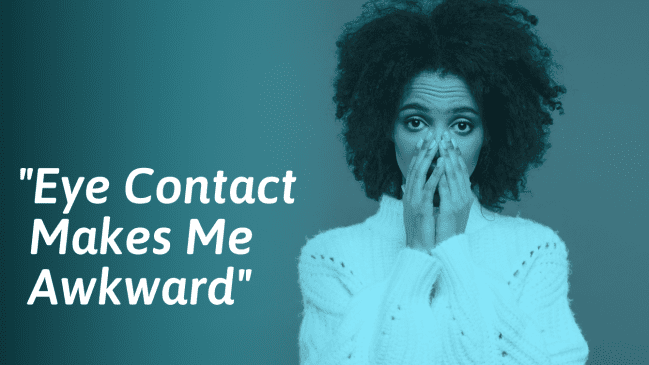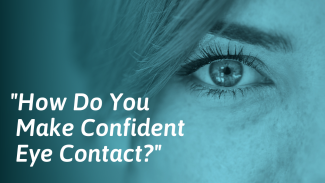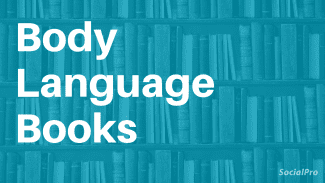“I can’t make eye contact during conversation. Whenever I am talking to someone and our eyes meet, I feel my heart beat faster, and I start to panic. I automatically look away, even if I tell myself that this time I will hold their gaze. What can I do about this?”
Some people seem to be naturals at maintaining eye contact. Looking at them, it might seem effortless to tell stories while smiling and maintaining eye contact.
It might seem that they were born with the ability, but it’s more likely that they have developed this skill over several years, beginning in young childhood.
The truth is that many people feel nervous while holding eye contact or find it hard to make eye contact. In this article, I’ll explain how to feel comfortable making eye contact while you’re talking to someone.
Sections
How to get comfortable with eye contact
1. Remind yourself of the benefits of eye contact
If you feel like eye contact is something that you “should” do but really don’t want to, it won’t be appealing. Compare going to the dentist to watching a movie that you were looking forward to.
How can you make practicing eye contact more appealing? Remind yourself what you will get out of it.
Make a physical list. You can include items such as:
- I will feel proud of myself for practicing something I find challenging.
- I will have a new method of getting to know people and letting people know me without speaking.
- It will help me improve my self-confidence.
- It will make me make new friends.
- I will feel more at ease in social situations.
Make sure to include the reasons that feel true to you. This list is highly personal – a benefit to you might mean nothing to someone else. Include as many reasons as you can think of.
2. Practice looking at yourself in the mirror
Looking at yourself in the mirror can increase your self-awareness and help you get used to those sensations when they come up in conversations with others.
One study asked participants to detect their own heartbeats after looking at a blank screen or at themselves in the mirror. Those who looked in the mirror did better at the task.[6]
It may feel strange to do, but the effects are worth it. As you become more comfortable looking at yourself, have conversations with yourself in the mirror. Say hello out loud as you look into your own eyes.
Notice what thoughts and sensations come up. Do you feel resistant? Are you judging yourself internally? You can learn a lot about yourself through this exercise. No one has to know you’re doing this – but trust me, they’ve probably tried it themselves at one point.
3. Study vloggers
Many people upload videos of themselves on Youtube, Instagram, or TikTok. Watch a few of these videos. Start by focusing on their body language and eye contact. While it’s true that they’re looking at a camera and not a real person, they are usually pretending to speak to someone to make it easier for themselves. Pay attention to when they look at the camera, and when they look away. Notice when they smile or gesture with their hands.
After a few videos:
- Imagine you’re in a conversation with them.
- Look into their eyes when they’re talking.
- Nod or respond when it feels appropriate.
When you feel ready to practice with real people, try video chats. The screen makes it easier as it acts as a sort of “barrier.” Looking into someone’s eye through a screen might feel safer and less intimidating than if they were standing right in front of you.
Consider using a support group or forum if you don’t have a family member or friend to practice with. You might find other people who want to practice the same type of skills as you do, and you could practice together. Or you might find someone looking to improve their English, or who is just feeling lonely and looking for a conversation.
4. Practice relaxation during conversations
Relaxing is easier said than done. If you were able to relax in conversations easily, you probably wouldn’t be reading this article. But if you’re overthinking making eye contact in conversation, it will become harder to do. Instead, practice taking a few deep breaths before a conversation. Try to do an activity that calms you down, or perhaps use aromatherapy (lavender is considered a relaxing scent and can reduce anxiety).[7]
When you notice yourself getting nervous in the conversation, breathe in deeply again. You can think of a mantra or statement ahead of time to reassure yourself when you start to panic or judge yourself. For example, you can use a statement like, “I am doing my best,” “I am worthy,” “I am deserving of attention and love,” or “I can choose positive thoughts.” Repeat it silently in your head while taking a deep breath. Then, return your attention to the conversation.
You can try relaxing your muscles right now and make sure you don’t tense up any part of your body. You can do this check occasionally when you’re by yourself. After some practice, you can do the same type of relaxation when you talk to someone.
5. Change the way you talk to yourself
You might be telling yourself something like, “I’m such a loser for needing help with something so simple. I should be better at this by now.”
The truth is a lot of people struggle with social interactions. And while some people find social interactions easier – everyone struggles with something. There are probably lots of things that you take for granted that others find challenging, for example, food and weight, or how to budget money. There is nothing wrong with you for struggling with this particular thing.
While it may feel like you have too many issues or are too far behind your peers, remind yourself that it’s a story you’re telling yourself.
So the next time you catch yourself criticizing yourself, what’s something more constructive you could tell yourself instead? For example, instead of saying, “I’m a loser,” you could say “I want to improve at this, but so do many others. And if I practice, it’s likely that I’ll get better over time.”
6. Practice when listening first, then when speaking
Most people find it easier to make eye contact when listening. That’s because when we are talking, we are more vulnerable, and eye contact increases that vulnerability.
Keeping that in mind, it makes sense to start practicing eye contact when you are listening to someone else speak. Notice how comfortable you are balancing listening and absorbing what they say, making eye contact, and giving signs that you are listening to them (like nodding and saying “uh-huh,” “wow,” or other suitable short responses).
Once you feel comfortable maintaining eye contact while listening to someone, you can start practicing making eye contact while speaking.
7. Realize that it’s not a staring contest
The term “maintaining eye contact” makes it sound like it’s some sort of contest where the person who looks away first loses.
The truth is that most people don’t maintain eye contact for a full conversation. In fact, direct eye contact is only about 30%-60% during a conversation (more when you are listening, less when you are talking).[8] But don’t try to calculate – just use that statistic to remember you don’t have to be looking straight into the other person’s eyes at all times.
In fact, you don’t have to look into a person’s eyes at all times during the conversation. Try looking at one eye, then the other. You can look down from their eyes to their nose, mouth, the spot between their eyes, or the rest of the face. Don’t forget to blink when you feel you need to.
A good trick is to make sure you look at someone’s eyes just long enough to make sure you could answer what color they are. Then you can let your eyes move around. Come back to the eyes occasionally.
8. Give yourself positive reinforcement
After the conversation, give yourself positive reinforcement. Even if the conversation did not go the way you hoped, remind yourself that you did your best and that change takes time. If you’ve ever trained a dog, you know that giving them a treat for good behavior is a more effective way of teaching them than yelling.
Giving yourself praise or an enjoyable activity after a conversation where you’ve tried to make eye contact will make the behavior more favorable for you, which will make it more likely that you’ll repeat it in the future. Give yourself a mental (or real) high-five, tell yourself that you did a good job, remind yourself that learning a new skill takes time, and do something that you find relaxing or enjoyable.
9. Analyze people’s eyes
Rather than thinking of it as looking someone in the eyes, make it your mission to figure out the eye color and look of people’s eyes. This can make the situation feel less uncomfortable to you.
We cover more tips in our article about confident eye contact.
Reasons why making eye contact may be difficult
Low self-esteem
Studies show that eye contact makes us more aware of ourselves.[3] For people with low self-esteem, that’s a challenging feeling. If we feel that there is something wrong with us, we will want to avoid becoming more aware of ourselves.
Indeed, a study that measured people’s self-esteem and how often they broke eye contact found that people with low self-esteem broke eye contact more frequently.[4]
If you have low self-esteem, you might feel like you’re not worthy of being looked at. If you think that you’re not good-looking, you might break eye contact so that the person you’re speaking with isn’t looking at your face. It can feel like you’re doing them a favor. You might not even notice that you’re thinking these thoughts if they have become too ingrained in your daily life.
If you need some extra help in boosting your self-esteem, try reading one of the books listed in our list of best books on self-esteem.
Social anxiety
Social anxiety can result from being bullied or other negative experiences, having little social interaction, or growing up on the autism spectrum. It can also develop for various other reasons.
Common symptoms include increased heartbeat or sweating while talking to other people, worrying about social interactions, and avoiding situations where you will need to interact with others.
Social anxiety can cause significant disturbances in your life. Luckily, there are many different types of treatments that may help your social anxiety. One study found that people with social anxiety did indeed have more fear of eye contact than those without social anxiety, but that fear was reduced after several weeks of taking anti-anxiety medication.[5]
If you feel that your social anxiety has been getting worse over the years, read our article on this topic.
Autism spectrum disorder
A study on toddlers with autism found that they look at people’s eyes less than their non-autistic peers from a very young age.[1]
If you grew up with autism, that means you might have missed years of eye contact that other children were making naturally, unless it’s an issue you worked on specifically. If you weren’t diagnosed as a child (and even if you were), it’s likely that you didn’t receive the right type of help for you.
Forced eye contact can feel downright distressing to many on the autism spectrum.[2]
We all want to avoid things that make us feel anxious or depressed, so it makes sense that people with autism will avoid eye contact when possible.
Some realize the importance of eye contact as a young adult and feel like they missed out on years of practice. Then, it can seem impossible to “catch up.”
Are you diagnosed as having Aspergers or being on the autism spectrum? Please read our article on how to make friends when you have Aspergers.
Bullying
If you were treated unkindly by family, classmates, or anyone else, your body would have learned that eye contact was dangerous.
Whether it was an adult saying that they’ll “wipe that smirk off of your face” or kids in school mocking you, you might have learned to avoid eye contact as a method of self-protection.
While it can feel challenging to change these kinds of automatic responses, it’s not impossible! Working on this issue in therapy alongside practicing the tips mentioned in this article can help you overcome your learned responses. Bullying and growing up in an unsupportive home can leave deep wounds, but a good therapist will help you work on healing.
We recommend BetterHelp for online therapy, since they offer unlimited messaging and a weekly session, and are cheaper than going to a therapist's office.
Their plans start at $64 per week. If you use this link, you get 20% off your first month at BetterHelp + a $50 coupon valid for any SocialSelf course: Click here to learn more about BetterHelp.
(To receive your $50 SocialSelf coupon, sign up with our link. Then, email BetterHelp’s order confirmation to us to receive your personal code. You can use this code for any of our courses.)
Lack of social interaction
Whether you were isolated due to bullying, social anxiety, or other reasons, a lack of social contact can make you uncomfortable with eye contact simply because it will feel unfamiliar.
This might be true especially if you were isolated as a young child. That’s because we learn things very quickly when we’re children, without having to overthink it. You can still learn new skills at any age.
See our guide on how to be more outgoing.
Common questions
Why is eye contact important?
Through eye contact, we gauge whether someone is listening to us, how they’re feeling, and how trustworthy they seem to us.
Making eye contact with someone signifies to them that we’re paying attention. If we’re talking to someone and they don’t meet our eye, we might think they’re hiding something.
People usually have difficulty maintaining eye contact when they’re lying. Another reason is not paying attention. If someone is looking away when we’re talking to them, it’s hard for us to understand if they’re listening or thinking about something else.
Why does eye contact make me feel uncomfortable?
Eye contact can make you feel uncomfortable if you’re not used to it, have low self-esteem, social anxiety, or suffered trauma. Eye contact makes you more aware of yourself, and that can make you more self-conscious.
If we’re used to getting negative attention (even from ourselves), we don’t want to be aware of other people noticing us. It becomes an instinct to look away when our eyes make contact.
We might be afraid of being vulnerable, exposing our emotions, or even think that we’re undeserving of being noticed. Making eye contact is a matter of practice, and you can teach yourself to become more comfortable with it.






Now I feel pressure to look people in the eye when I have conversations, which may make me even less social, lol…
Dear David, thank you so much for this post. I have been reading your newsletter for a while now and it has helped me incredibly. I’ve gotten the motivation to get a job, wake up in the mornings and get out of a loop of self-criticism and constant depression. My self-esteem has improved so much just from practicing by myself or at work. I really do appreciate what you do and how it’s helping me in my personal life.